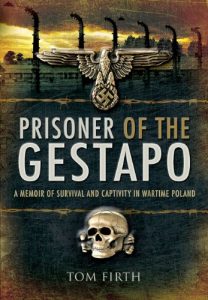Tom Firth was born in Japan where his English father and Polish mother were living. He begins by describing his unusual childhood and the devastating Yokohama earthquake in 1923. In 1930 the family settled in Warsaw, Poland. However they became split up when Poland became overrun by the Nazis and the Russians in 1939. Whilst his father and older brother were in England, Tom found himself trapped in the Russian-occupied part of the country and, after several agonizing months, eventually made his way to Warsaw where his mother had managed to survive the bombing of the city. He vividly describes life under both regimes, as well as the cat-and-mouse game his mother was forced to play with the Gestapo in order to avoid arrest. Later, both became deeply involved with the sheltering of escaped British prisoners of war and it was this activity which led to his capture and imprisonment in a jail in Krakow. Miraculously released after eighteen months captivity, largely due to his command of the Polish language, he vowed to escape to Britain at all cost.
Later in the war and after many harrowing experiences he succeeded in getting through to the Red Army, but was again faced with hostility, suspicion and imprisonment. Held for several months in primitive conditions, he, along with two British companions was finally taken to Moscow and handed over to the British Military Mission there. Arriving in Scotland with a convoy of supply ships late in December 1944, he had the galling experience of spending a night in Brixton Prison. With nowhere to go he then began a frantic search for his father and brother, who were convinced that he was dead. His dream came true, but even after the ending of hostilities and later in time, tragedy struck with the news of his mother’s arrest by the Polish Communist authorities. Sentenced to death for alleged espionage, she spent several years in prison, being freed in a Government amnesty and arriving in England in 1956.
Later in the war and after many harrowing experiences he succeeded in getting through to the Red Army, but was again faced with hostility, suspicion and imprisonment. Held for several months in primitive conditions, he, along with two British companions was finally taken to Moscow and handed over to the British Military Mission there. Arriving in Scotland with a convoy of supply ships late in December 1944, he had the galling experience of spending a night in Brixton Prison. With nowhere to go he then began a frantic search for his father and brother, who were convinced that he was dead. His dream came true, but even after the ending of hostilities and later in time, tragedy struck with the news of his mother’s arrest by the Polish Communist authorities. Sentenced to death for alleged espionage, she spent several years in prison, being freed in a Government amnesty and arriving in England in 1956.






